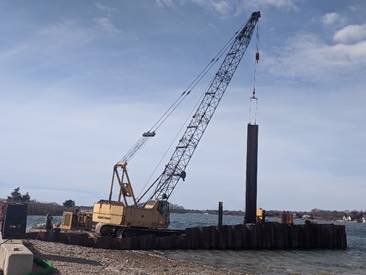New
ramp and floating dock to ease launch and retrieval of boats
 The Department of Environmental Management (DEM) and The Nature Conservancy
(TNC) announce that construction of boat ramp improvements at Quonochontaug
(Quonnie) Breachway in Charlestown is underway.
The Department of Environmental Management (DEM) and The Nature Conservancy
(TNC) announce that construction of boat ramp improvements at Quonochontaug
(Quonnie) Breachway in Charlestown is underway. The project will provide boaters and anglers with improved access to the coastal salt ponds, which are among Rhode Island's most popular boating, fishing, and public recreation areas.
The
existing ramp will be replaced by a new concrete boat ramp, measuring 24 feet
in width. As an added amenity, DEM also will install a new, six-foot wide
floating dock with cleats and rub rails for boaters to tie to when launching or
retrieving their vessel.
With the reconstruction, the boat ramp will be reoriented in a north-south direction so boaters can safely launch without having to fight the strong currents in the breachway channel. As part of the construction project, DEM hopes to receive a final permit to complete shoreline stabilization work to further protect the parking area from erosion.
Originally installed in 1971, the existing boat ramp slabs at Quonnie will be removed and large flat stones will be put in their place, offering an additional fishing area. The boat ramp is expected to be completed by April 30, 2020. The floating docks are expected to be installed next fall. The project contractor will provide a temporary means to tie off vessels until the docks are installed.
With the reconstruction, the boat ramp will be reoriented in a north-south direction so boaters can safely launch without having to fight the strong currents in the breachway channel. As part of the construction project, DEM hopes to receive a final permit to complete shoreline stabilization work to further protect the parking area from erosion.
Originally installed in 1971, the existing boat ramp slabs at Quonnie will be removed and large flat stones will be put in their place, offering an additional fishing area. The boat ramp is expected to be completed by April 30, 2020. The floating docks are expected to be installed next fall. The project contractor will provide a temporary means to tie off vessels until the docks are installed.
"Increasing access to outdoor recreation in Rhode Island is a top priority of DEM," said DEM Director Janet Coit. "Working with strong partners such as The Nature Conservancy to invest in providing better recreation opportunities to fishers, boaters, and paddlers at Quonnie – one of our state's true treasures – will allow more people to connect with nature. This is a rewarding project that we are excited to announce."
The
boat ramp will be closed during construction, and for safety reasons, access to
the site will be restricted during much of the project. Barriers will limit
access to West Beach Road during construction hours beginning on Friday,
February 14.
At over 700 acres, Quonnie Pond is Rhode Island's deepest and most saline salt pond. It has more than 80 acres of salt marsh, which host vital fish and bird populations. Commonly caught fish species in the area include striped bass, black seabass, tautog, scup, summer flounder, and bluefish.
Recreational boating and fishing are ingrained in the culture of the Ocean State. They also are important economic drivers: 54,000 boats use Rhode Island waters each year, including more than 40,000 registered in Rhode Island. As part of a larger network of recreational opportunities in the state, fishing plays an important role in connecting people with nature, promoting health, and attracting tourism.
According to the U.S. Fish & Wildlife Service, there are approximately 175,000 recreational anglers (age 16+) in Rhode Island. And recreational fishing contributes more than $130 million to the economy each year.
TNC,
in partnership with DEM, contracted with Fuss & O'Neill for a boat ramp
design that will provide safer access for boaters and improve users' launch and
retrieval efforts. TNC's conservation engineer will oversee the management of
the project, as part of DEM's plan to improve access to Rhode Island's natural
resources.
The improvements will complement the significant salt marsh restoration and enhancement at Quonnie Pond that was conducted by CRMC in late 2018 and early 2019.
The improvements will complement the significant salt marsh restoration and enhancement at Quonnie Pond that was conducted by CRMC in late 2018 and early 2019.
Much
of the funding for the project will be provided by the U.S. Fish and Wildlife
Service Sport Fish Restoration Program. The entire construction project is
expected to cost approximately $475,000.
The Sport Fish Restoration Program is a user-pay, user-benefit program that is derived from taxes on motorboat fuel, fishing equipment, and the purchase of some boats. A portion of the national funding is dedicated to DEM's Division of Fish and Wildlife, specifically for boating access.
This project is an excellent example of how these taxes are used for direct public benefit to improve and increase boating access to the waters of the state. The required matching funds for the project will be provided by revenues from saltwater fishing licenses.
The Sport Fish Restoration Program is a user-pay, user-benefit program that is derived from taxes on motorboat fuel, fishing equipment, and the purchase of some boats. A portion of the national funding is dedicated to DEM's Division of Fish and Wildlife, specifically for boating access.
This project is an excellent example of how these taxes are used for direct public benefit to improve and increase boating access to the waters of the state. The required matching funds for the project will be provided by revenues from saltwater fishing licenses.
For
a list of public boat launching sites in Rhode Island, visit www.dem.ri.gov.
Follow DEM on Twitter (@RhodeIslandDEM) or Facebook at www.facebook.com/RhodeIslandDEM
for more information on boating in Rhode Island as well as other timely
updates.
Related
links